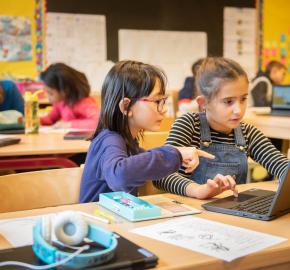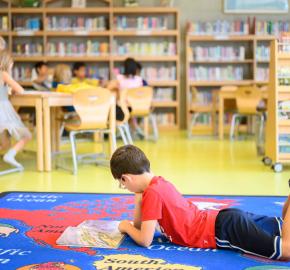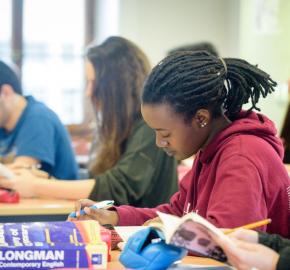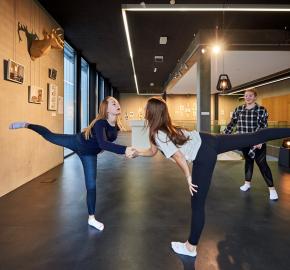My First School is a personal project for photographer, alumnus Andrea Francolini (LGB, 1990), who has a keen interest in Pakistan's diverse society. Away from the struggles reported by the media, Pakistani people are open, friendly and family-oriented but face serious challenges in everyday life just to make ends meet. Children can be affected more than most.
Education, as expected, can take second place to survival in these circumstances, and Andrea's goal is to help these families send their children to school for a basic education. Learn more in the fascinating interview below:
1. What motivated you to create My First School Pakistan?
I had been travelling to Pakistan on a yearly basis since 2008, first for pleasure and then for magazine assignments. In 2009 I visited a school in the northern part of the country as part of an article on women working in an Islamic society. The principal of the school, Shamim, told me that she started teaching children by hiding in a closet or at the back of the house, since it was rare at the time for girls to have access to education. Decades later, she opened her own school, which amounted to no more than four walls and a roof. No desks, benches or electricity. After I finished the shoot, I asked the principal what her school needed. I could afford enough for each child to have two new textbooks, pencils, eraser and a ruler. So, I went to the local bazaar, bought everything and handed it over, not thinking much of it.
It is this encounter with Shamim that later gave me the idea to start this project. She has now retired and every year I go see her. She does not speak English, but I always get a big hug.
The following year, I did not go to Pakistan since the birth of my first child was imminent. One day I was shopping for baby clothes and I saw two women in niqabs and perusing baby clothes too. In this neighbourhood of Sydney, it was very rare to see women wearing full face veils. I stood back and watched them giggle over the cute clothing and thought to myself, “Wow, I would be devastated if my daughter could not get a proper education because of her gender and where she lived.” I forgot to buy what I had come for and went home to call my guide in Pakistan with an idea.
The idea was to improve schooling conditions in a particular valley in the northern part of the country that I had visited. Although schools exist, they all require serious upgrades.
In 2011, My First School became an Australian registered charity. We only help community schools. A local carpenter makes desks and benches. I buy any materials needed to fix schools and employ local labour to do the constrictions needed. The salaries of three teachers are paid for and we sponsor two children by paying their full schooling fees.
2. What accomplishment relative to My First School are you most proud of?
Oh, this is too hard to answer as every brick makes a difference. The two that jump out the most are a girl called Khizra, who we have sponsored for the past 6 years. Her parents were going to pull her out of school at the age of 5 because she had to help her mother in the fields, as she had 3 younger siblings. So, we pay for her tuition, and ever since she is at the top of her class. Imagine the potential that would have been lost if she stopped school?
The second is a school we have been helping since the beginning. When I first saw this school, it had two classrooms built out of bricks and 4 which were tents. This village is nestled 2500m up in the mountains, so while in summer this is a suitable arrangement, but come wintertime, half of the school had to shut down due to freezing temperatures. So, the first year we removed the tents and rented a house in the village. The following year, we were able to build 3 classrooms with bricks as well as a bathroom.
In 2019, I went back to visit and the principal grabbed me by the arm the moment I arrived and pulled me into a classroom that had been built with the donations we received. The classroom looked the same as the previous year, but the principal stood next to a switch board and said: “Look, Sir,” as he flicked a switch and a lightbulb turned on, “we have electricity now. Thank you!”
Due to Covid-19, I was unable to go back to Pakistan, but I am curious to see what we can do this year.
3. Was this your first major foray into the world of philanthropy and fundraising?
I had never planned to start a charity in my life. I always help when I can with my savings but setting something like this and sustaining it for past 10 years was that last thing on my mind.
When I had the idea, I did some research on how to raise funds in Australia. It was very complicated to do it legally, so the first year I simply emailed my friends asking for help. One of these friends ending up introducing me to a huge law firm in Sydney. I was given 30 minutes to pitch my plans in Pakistan. There were four lawyers sitting opposite me listening and only one showed a vague interest. Three weeks after that meeting, I got an email saying that the law firm would do all the work pro-bono to set up the charity and follow it for as long as I would operate it. WOW! Talk about the pieces falling into place at the right time. For me this was an incredible sign and I never looked back.
My First School has been active for the past ten and there are still many things to do. The main goal is to identify companies that would be willing to make regular donations. The next step is to build a secondary school, which does not exist in the area where we operate. This is when many children drop out of school, especially girls. The goal would be to have a secondary school that local children could attend free of charge. The charity would cover all of the expenses and teacher salaries.
4. What words of advice would you give to those who would like to start a similar project? What were the biggest obstacles to overcome? What has been most rewarding?
Firstly, you must be very passionate about what you are doing, otherwise you will probably not have the perseverance to continue. Secondly you must surround yourself with honest people, especially if you are not on location to oversee things. I go every year to Pakistan with the funds raised. Saeed does the groundwork before I arrive so that we know what needs to get done and I can hit the ground running. He never takes a salary. He just tells me who I need to pay and what it covers.
There are tons of rewards every day. Seeing the children’s faces when they sit on a bench and not on the ground. An elder of the village coming to the school when he knows I am in town for a cup of tea and give me, a total stranger, a hug. I don’t speak Urdu and this elder does not speak English but body language and the smile on his face say it all.
One year there was a tractor driver who helped deliver some furniture to a school. I paid him once he did the job and we parted ways. The following year he was there again with his tractor to help deliver more furniture. I went to pay him the same amount and he gave me back half the money I gave him. In very broken Urdu, I said: “Last year you asked me for twice this amount.” He replied, “Sir, this year, you are helping my child’s school, so I help you. Thank you.” I was speechless. Imagine this happening in our society. It simply wouldn’t. For me, this is a sign of the locals embracing our work and appreciating our efforts.
One year, we had a school that needed bricks to build two more classrooms. We bought the materials and they started building before I even left. The following year, I went to see the new classrooms, and, to my great surprise, there were three new rooms, not two. I asked Saeed from where they had received the extra money for the third classroom and he said: “The school needed three classrooms, so with your money they bought all the materials and some locals donated their time so the school would get what it needed.”
You know the expression, “those who have less give more”? This is a typical example of people who live in poverty, but they are ready to help in any way they can.
5. How has your Ecolint experience shaped your vision of service and philanthropy?
I am sure that having grown up with so many people from different backgrounds opened my eyes and mind. The rest is thanks to my mother, who always did (and continues to do) a lot of charity work. She never bragged about it. I simply learned by following her example. Her mother was the same, apparently. So, you can say it runs in the family!



